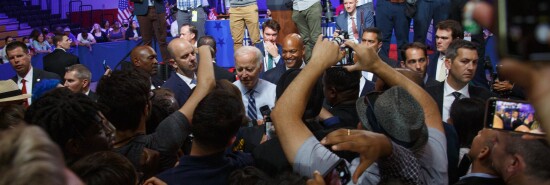
For Biden, Trump, and DeSantis campaigns, taxpayer-funded security will save millions of dollars
Tom Rogan
Video Embed
As the 2024 presidential primary field grows, President Joe Biden, former President Donald Trump, and Gov. Ron DeSantis (R-FL) have a key advantage over other candidates. They retain round-the-clock taxpayer-provided protective details.
Biden is protected by the Secret Service’s extensively resourced Presidential Protective Division. As a former president, Trump will receive lifetime Secret Service protection. As the Sunshine State’s incumbent governor, DeSantis and his family are protected by the Florida Department of Law Enforcement’s Protective Operations Section. For all three candidates, this protection is fully funded by taxpayers without campaign compensation. This includes Secret Service funding for hotels, meals, and travel for the hundreds of agents and officers assigned to protect Biden and Trump.
AMERICANS DESERVE ACCOUNTABILITY ON DOMESTIC SPYING
The Florida department similarly confirmed to the Washington Examiner that it pays all expenses related to DeSantis’s detail. Its records show that between July 1, 2021, and June 30, 2022, the agency spent a total of $4,766,643.40 on DeSantis’s protection. The costs incurred by the Secret Service to protect Biden and Trump will be far higher.
Put another way, this security gets expensive, quickly.
It’s not just about the immediate agents surrounding each protectee. Provision for both short- and longer-notice campaign events and unplanned stops such as restaurant walk-ins, etc., mean that the resources involved in this protection are significant. Protective agents also provide extensive advance work to survey sites to be visited and establish protocols for the screening of guests. As president, Biden’s security is a significant national security concern. Trump and DeSantis’s association with various emotive political issues means that they are likely to receive a steady stream of threats.
While an incumbent president’s campaign is supposed to repay the military for campaign-related travel costs, like his predecessors (including Trump), Biden is likely to avoid this expensive responsibility by organizing noncampaign events as part of campaign trips. Reciprocal state-to-state protective arrangements for governors will likely mean that DeSantis’s detail is sometimes supplemented by the Florida department’s equivalent organizations during his travels.
Top line: Considering the early stage of the presidential campaign, this taxpayer-provided protection will save millions of dollars for each campaign.
That is money that can be saved for advertising, events, and the other politicking that ultimately defines any campaign. In contrast, at least for the moment, the other campaigns will have to pay for candidate security from their own budgets. And while local police forces will attend some campaign events, a candidate’s private security detail lacks the law enforcement power of the Secret Service and Florida.
This includes former Vice President Mike Pence, who is expected to join the campaign trail this week. As a former vice president, Pence received Secret Service protection only for the first six months after he left office. Similarly, only while serving as U.S. ambassador to the U.N. did Nikki Haley receive protection from the Diplomatic Security Service.
It is unclear whether Sen. Tim Scott (R-SC) receives a Capitol Police detail, which is normally reserved for leadership figures and members of Congress assessed as facing particular, specific threats. It is worth noting, however, that Scott would likely receive early Secret Service protection were his campaign to request it. This reflects concerns over racially motivated threats and an associated protective principle set by then-Sen. Barack Obama’s first presidential campaign. Obama began receiving Secret Service protection in May 2007.
In the early months of 2024, the Secret Service will start providing protective details to other candidates that remain in the race. A la Obama, the Secret Service may provide protective details before then if specific threats are identified and the Department of Homeland Security and a congressional panel agree such security should be provided.
Until then, however, Trump, Biden, and DeSantis have a small but significant advantage over their rivals.
